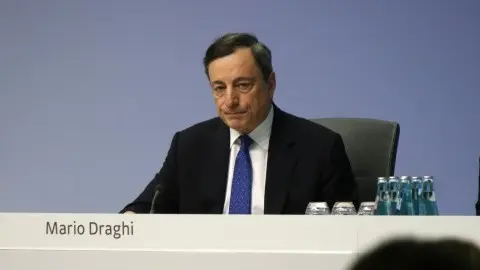Expect ‘verbal acrobatics’ from ECB’s Draghi
Next week's European Central Bank meeting is going to be a double balancing act for President Mario Draghi and his colleagues.
Verbal acrobatic skills
How will the ECB get round a pretty basic conundrum? On the one hand, the ECB wants to prepare financial markets for tapering, without creating a ‘taper tantrum’. On the other hand, in a world without inflationary pressure, the ECB will have to substantiate the tapering preparation with economic arguments that do not leave market participants completely stumped: a balancing act that requires all of Draghi’s verbal acrobatic skills.
Growth without inflation
The general macro picture in the Eurozone has not changed since the ECB’s early June meeting. Confidence indicators remain strong, despite some recent downward corrections. Activity has picked up further, but inflationary pressures are almost impossible to find. If anything, the drop in oil prices, the pickup in bond yields and the strengthening of the euro have further (at least technically) deteriorated the ECB’s inflation outlook.
Disinflationary without deflation
More generally speaking, the ECB will continue facing very little home-made inflationary pressures.
There are reasons to believe that wage growth in the Eurozone is bound to stay lacklustre.
Slack in the labour market and sectoral and technological changes all argue against a fast pick-up in Eurozone wage growth, even with GDP growth above trend growth. In addition, digitalisation, as long as it continues to increase in importance in B2B and B2C, is likely to apply downward pressure on consumer prices due to higher price transparency and more competition, now also in services.
Preparing without distorting
Evidently, given bond market developments of the last two weeks, the ECB’s macro assessment will not be the main item on next week’s meeting agenda. A possible unwinding, or tapering, of QE is on the top of the mind of every market participant and ECB watcher. We believe that, given the cyclical upswing, the disappearance of deflationary risks, opposition to QE from some ECB members and the bond supply scarcity issue, the ECB wants to move towards tapering. However, the ECB ideally would like to prepare markets without distorting them.
Tapering without inflation
In this process of moving towards tapering, the absence of any inflationary pressure makes the narrative a bit complicated. This is why Draghi tried to adjust the official communication and line of argumentation away from inflation and towards a new concept of a monetary policy ‘speed limit’. In this context, the key phrase in Sintra, Portugal, was: “As the economy continues to recover, a constant policy stance will become more accommodative, and the central bank can accompany the recovery by adjusting the parameters of its policy instruments – not in order to tighten the policy stance, but to keep it broadly unchanged”; the ideal new narrative for the ECB to prepare to taper.
Verbal acrobatics without action
In our view, the ECB’s ‘tiptoeing’ towards tapering will continue and we expect Draghi to repeat the key messages from the Sintra speech next week. Particularly, however, the reaction of bond markets over the last two weeks was a good reminder of how thin the line is between preparing markets and distorting them. Though some steepening of the yield curve is fine, a real ‘taper tantrum’ is not. This is why some dovish remarks by Draghi should not be excluded. The best way to do this would be by stressing the sequencing, ie, by dropping clear hints that a first interest rate hike will not come before the end of QE.
Download
Download article
18 July 2017
Our guide to July’s ECB meeting This bundle contains {bundle_entries}{/bundle_entries} articlesThis publication has been prepared by ING solely for information purposes irrespective of a particular user's means, financial situation or investment objectives. The information does not constitute investment recommendation, and nor is it investment, legal or tax advice or an offer or solicitation to purchase or sell any financial instrument. Read more
